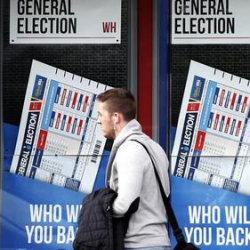
Bookmakers Estimate 2016 Presidential Prop Bets Would Produce Numbers Like the Super Bowl
The Chicago Tribune printed an op-ed piece by Stephen L. Carter on propositions bets on 2014. The article opened with a discussion of European sportsbooks which had Hillary Clinton as a heavy favorite to be elected the next U.S. President. Then Mr. Carter asked the question: Why isn’t gambling on elections allowed in the United States?
The Tribune writer said such betting would increase voting at the poll’s, because voters would feel like they had more at stake. Presidential prop bets also would be a favorite with the bookmakers themselves, who predict it would be one of the busiest nights in the four-year cycle.
One Las Vegas sportsbook director said, “It would be the type of money that we write on Super Bowl Sunday.”
$150 Million in UK Election
In the recent UK elections, proposition betting accounted for $150 million in action. While the Super Bowl Sunday wagering does not quite add up to that amount ($115 million this past year), it would be a huge payday for the Las Vegas Strip. Given that POTUS election betting only would happen once every 4 years, it might be seen as negligible by the lawmakers themselves.
One advantage is it would offer more information for pollsters. The Chicago newspaper predicted the election markets would work far better at taking the pulse of the people than would traditional polls, because people would be putting their money where their mouth is.
Arguments Against POTUS Prop Bets
Opponents could make a number of arguments against legalizing presidential prop bets. One, they probably imagine we couldn’t know whether the election betting could predict the outcome until a few election cycles passed. Two, people might see gambling on the election as unethical or immoral, given the weightiness of the matter.
People also might be appalled to hear that the population would be more willing to vote if they had a bet on the results, because it would make them feel like they had more at stake. As politicians and public service announcements each voting cycle point out, Americans have plenty at stake when electing officials–none more so than the president.
History of US Prop Bets
As late as 2012, Americans could make certain election wagers. Then the Commodity Futures Trading Commission brought a lawsuit against Intrade, a bookmaker site out of Ireland. The CFTC said Intrade was virtually selling options contracts (binary options) outside an approved exchange. The suit forced Intrade to close its business a few months later.
That was not the first legal case in the United States against election wagers. Back in the 19th century, Pennsylvania ruled that voters could bet on the primaries, but not the presidential election. No one made much of a case why one was corrupting the process and the other was not.
Hurtful to Society
Also in the 19th century, a judge in the state of Delaware ruled that betting operators could not collect elections bets, because betting on election was “hurtful to society“. The court also argued that betting had a tendency to corrupt “the due administration of government“.
Apparently, the judge in the Delaware case ruled that rigging an election in order to have access to the power of the presidency wouldn’t be enough motivation for election-fixers. If they also had the incentive of winning a quick buck at the casino after rigging the election, that would cause the fixers to spring into action.
US Politicians Placing Bets
Such laws did not have the desired effect. Numerous famous people of the time admitted to making political wagers. Harry Daugherty, a Republican political boss who is thought to have arranged for Warren G. Harding to win the presidency in 1920, said that “his wager on James Garfield in the 1880 presidential election enabled him to finish school in ‘good style.'”
The Oxford Handbook of the Economics of Gambling contains an article from economists Koleman S. Strumpf and Paul W. Rhode which stated in matter-of-fact terms that presidential prop bets were a matter of course in pre-Civil War America.
The 1876 Election, which was one of the most hotly-contested elections in American history, received so much betting action that one man, John Morrissey, handled $350,000 in bets. That would amount to $8 million in 2015 dollars. Eventually, the Compromise of 1877 allowed the Republicans to retain the White House for the 5th election in a row, as Rutherford B. Hayes was given the win over Democrat Samuel J. Tilden. In exchange, the GOP agreed to end Reconstruction in the South.
Future Betting on Electoral Contests
All of this is to say there’s nothing new under the Sun. People are always going to want to gamble on politics, just as the Democrats and Republicans are always going to quarrel over the same. In 2016, hundreds of millions of dollars are going to be wagered on the outcome of the US presidential contest. The question is whether the American people will–or should–be allowed to legally gamble on the results.
